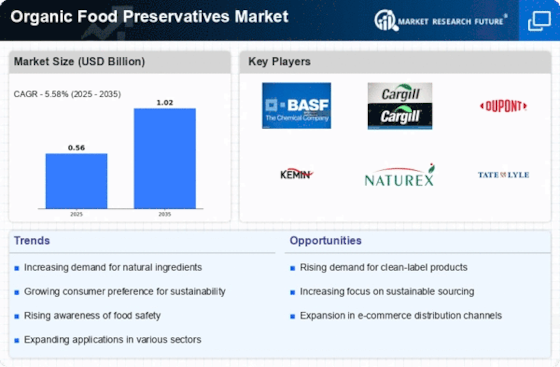Top Industry Leaders in the Organic Food Preservatives Market

The competitive landscape of the organic food preservatives market is marked by dynamic strategies and a robust presence of key players striving for market dominance. A critical analysis of this landscape provides insights into the strategies adopted, factors influencing market share, new and emerging companies, industry news, current company standings, investment trends, and recent developments in 2023.
Key Players:
- Cargill Incorporated (U.S.)
- DuPont de Nemours Inc. (US)
- Tate & Lyle (U.K.)
- Univar Inc. (U.S.)
- Akzo Nobel N.V. (Netherlands)
- Kemin Industries Inc. (U.S.)
- Hawkins Watts Limited (Australia)
- Danisco A/S (Denmark)
- Koninklijke DSM N.V (Netherlands)
- Brenntag Solutions Group Inc. (Germany)
- Hawkins Watts Limited (New Zealand)
- BASF SE (Germany)
- Galactic S.A.(Belgium)
- Archer Daniels Midland Company (U.S.)
- Kerry Group plc (Ireland)
Strategies Adopted:
Market leaders are increasingly focusing on strategic collaborations, partnerships, and acquisitions to enhance their product offerings and expand their geographic presence. Joint ventures between key players and regional distributors aim to streamline the supply chain and improve market penetration. Moreover, investments in research and development for innovative preservative solutions and sustainable packaging technologies remain pivotal strategies to stay ahead in this competitive landscape.
Factors for Market Share Analysis:
Market share in the organic food preservatives sector is heavily influenced by factors such as product innovation, regulatory compliance, and efficient distribution networks. Companies that invest in research and development to create preservatives with longer shelf life, minimal impact on taste and nutritional value, and compliance with stringent organic standards gain a competitive edge. Additionally, robust marketing and branding efforts play a crucial role in capturing consumer trust and loyalty, impacting market share.
New and Emerging Companies:
The market has witnessed the emergence of several new players, including Naturex SA, Kalsec Inc., and Chihon Biotechnology Co. Ltd. These companies are leveraging technological advancements and sustainable practices to carve out a niche in the organic food preservatives market. Their agility and focus on niche segments contribute to the diversification of the competitive landscape.
Industry News and Current Company Standings:
Recent industry news has highlighted strategic alliances and mergers. For instance, Archer Daniels Midland Company acquired a stake in a leading organic preservatives startup, reinforcing its commitment to sustainability. Cargill's implementation of state-of-the-art production facilities has strengthened its position as a key player, allowing the company to meet the escalating demand for organic food preservatives.
Investment Trends:
Investment trends in the organic food preservatives market reveal a growing interest in sustainable and environmentally friendly solutions. Venture capital funding has surged for startups specializing in natural preservatives, signaling a collective industry effort to move away from synthetic additives. Additionally, investments in research to develop cost-effective organic preservatives have attracted substantial funding from private equity firms seeking long-term sustainability.
Overall Competitive Scenario:
The overall competitive scenario is characterized by intense rivalry among key players, driving continuous innovation and strategic collaborations. Companies are vying for consumer attention by emphasizing clean labels, organic certifications, and eco-friendly packaging. The push toward natural and clean-label solutions has created a competitive environment where differentiation through sustainable practices and product efficacy is crucial.
Recent Developments
The organic food preservatives market experienced notable developments. DuPont de Nemours, Inc. launched a groundbreaking organic preservative derived from plant extracts, positioning itself as an industry leader in clean-label solutions. Kerry Group expanded its market presence through strategic acquisitions, diversifying its product portfolio and reinforcing its commitment to catering to evolving consumer preferences.
Cargill's investment in cutting-edge technology for sustainable packaging garnered attention, showcasing the company's dedication to reducing environmental impact throughout the supply chain. These developments underscore the industry's collective efforts to align with consumer demands for natural, sustainable, and ethically produced organic food preservatives.











